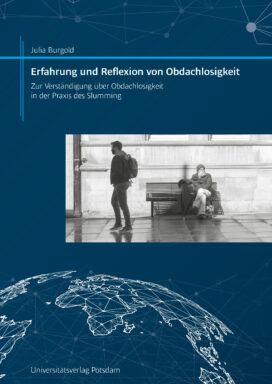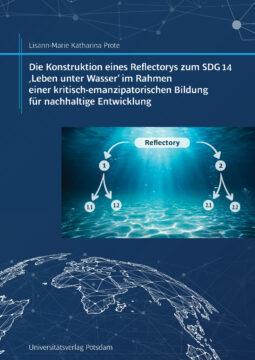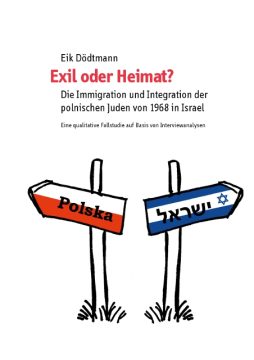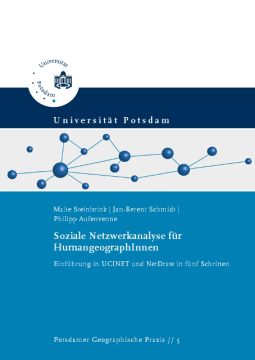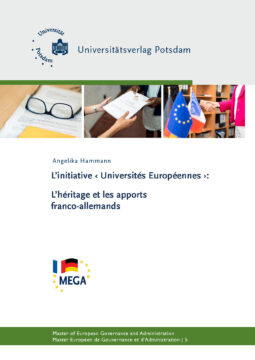The book provides an insight into the social practices of mutual understanding occurring during city tours with former homeless people, which operate with the goal of increasing understanding, tolerance and recognition for people affected by homelessness. First, the discourse of slum tourism is reviewed and, considering the diversity of this phenomena, the term “slumming” is defined as an organized encounter with social inequality. The central lines of discourse and the moral positions woven into them are thus traced and reinterpreted within the framework of the adopted sociological perspective of knowledge as an expression of a polycontextural practice per se. Through this lens, slumming then appears as an organized encounter of ways of life that are alien to each other in a way that defies immediate understanding, and for this very reason must be negotiated on the basis of common sense interpretations. Against this background, this study examines how participants and city guides communicate about the experience of homelessness and focusses on the thereby generated kind of understanding of homelessness. Of particular interest here are the possibilities and limits of the mutual understanding between the former homeless guides and their predominantly bourgeois attendees. For this purpose, the transcripts of conversations taken during nine city tours from different providers in German-speaking countries were analyzed using the procedure of the documentary method. This comparative examination offers not least a differentiated perspective on the practices of recognition that are always inherent in the processes of understanding. Concerning the moral debate surrounding organized encounters with social inequality, this ultimately suggests a shift in the ethical framework away from the issue of representation toward one of mediation.
Zur Verständigung über Obdachlosigkeit in der Praxis des Slumming
ISBN: 978-3-86956-541-5
342 pages, Paperback
Release year 2022
Series: Potsdamer Geographische Praxis , 18
21,50 €
Non-taxable transaction according to § 1 (1) UStG/VAT Act in combination with § 2 (3) UStG/VAT Act a. F. Providing this service, the University of Potsdam does not constitute a Betrieb gewerblicher Art/Commercial Institution according to § 1 (1) No. 6 or § 4 KStG/Corporate Tax Act. If the legal characterization of our business is changed to a commercial institution subsequently, we reserve the right to invoice VAT additionally. zzgl. Versandkosten
The book provides an insight into the social practices of mutual understanding occurring during city tours with former homeless people, which operate with the goal of increasing understanding, tolerance and recognition for people affected by homelessness. First, the discourse of slum tourism is reviewed and, considering the diversity of this phenomena, the term “slumming” is defined as an organized encounter with social inequality. The central lines of discourse and the moral positions woven into them are thus traced and reinterpreted within the framework of the adopted sociological perspective of knowledge as an expression of a polycontextural practice per se. Through this lens, slumming then appears as an organized encounter of ways of life that are alien to each other in a way that defies immediate understanding, and for this very reason must be negotiated on the basis of common sense interpretations. Against this background, this study examines how participants and city guides communicate about the experience of homelessness and focusses on the thereby generated kind of understanding of homelessness. Of particular interest here are the possibilities and limits of the mutual understanding between the former homeless guides and their predominantly bourgeois attendees. For this purpose, the transcripts of conversations taken during nine city tours from different providers in German-speaking countries were analyzed using the procedure of the documentary method. This comparative examination offers not least a differentiated perspective on the practices of recognition that are always inherent in the processes of understanding. Concerning the moral debate surrounding organized encounters with social inequality, this ultimately suggests a shift in the ethical framework away from the issue of representation toward one of mediation.
Recommended Books
-
 2025
2025Konstruktion eines Reflectorys zum SDG 14 ‚Leben unter Wasser‘ im Rahmen einer kritisch-emanzipatorischen Bildung für nachhaltige Entwicklung
16,00 €Non-taxable transaction according to § 1 (1) UStG/VAT Act in combination with § 2 (3) UStG/VAT Act a. F. Providing this service, the University of Potsdam does not constitute a Betrieb gewerblicher Art/Commercial Institution according to § 1 (1) No. 6 or § 4 KStG/Corporate Tax Act. If the legal characterization of our business is changed to a commercial institution subsequently, we reserve the right to invoice VAT additionally.
zzgl. Versandkosten
Add to cart -
 2014
2014Exil oder Heimat?
17,50 €Non-taxable transaction according to § 1 (1) UStG/VAT Act in combination with § 2 (3) UStG/VAT Act a. F. Providing this service, the University of Potsdam does not constitute a Betrieb gewerblicher Art/Commercial Institution according to § 1 (1) No. 6 or § 4 KStG/Corporate Tax Act. If the legal characterization of our business is changed to a commercial institution subsequently, we reserve the right to invoice VAT additionally.
zzgl. Versandkosten
Add to cart -
 2013
2013Philipp Aufenvenne, Jan-Berent Schmidt, Malte Steinbrink
Soziale Netzwerkanalyse für HumangeographInnen
7,50 €Non-taxable transaction according to § 1 (1) UStG/VAT Act in combination with § 2 (3) UStG/VAT Act a. F. Providing this service, the University of Potsdam does not constitute a Betrieb gewerblicher Art/Commercial Institution according to § 1 (1) No. 6 or § 4 KStG/Corporate Tax Act. If the legal characterization of our business is changed to a commercial institution subsequently, we reserve the right to invoice VAT additionally.
zzgl. Versandkosten
Add to cart -
 2022
2022L’initiative «Universités Européennes»
Non-taxable transaction according to § 1 (1) UStG/VAT Act in combination with § 2 (3) UStG/VAT Act a. F. Providing this service, the University of Potsdam does not constitute a Betrieb gewerblicher Art/Commercial Institution according to § 1 (1) No. 6 or § 4 KStG/Corporate Tax Act. If the legal characterization of our business is changed to a commercial institution subsequently, we reserve the right to invoice VAT additionally.
Read more
Publisher Info
Contact
Potsdam University Library
University Press
Am Neuen Palais 10
14476 Potsdam
Germany
verlag@uni-potsdam.de
0331 977-2094
0331 977-2292

